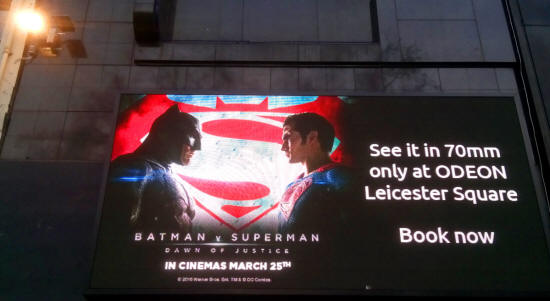March Madness: "Batman v. Superman" - is there a joker in the deck? |
Read more at in70mm.com The 70mm Newsletter |
| Written by: Lee Pfeiffer | Date: 21.03.2016 |
 "Batman
V. Superman: Dawn of Justice" at the Odeon Leicester Square in London,
England. Image by Ben Wales "Batman
V. Superman: Dawn of Justice" at the Odeon Leicester Square in London,
England. Image by Ben WalesClick to see enlargement The heavily-hyped Warner Brothers super hero epic "Batman V. Superman: Dawn of Justice" is one of the most heavily promoted films in years. It's also one of the most expensive. Variety estimates that the film's $250 million production budget plus ancillary marketing costs will make it necessary for the movie to gross $800 worldwide just to break even. You read that right: $800 million. One industry analyst says that anything less than a gross of $1 billion will be considered a disappointment. Warner Brothers contends that those figures don't take into consideration ancillary revenues from video and merchandising. Fair enough, but if a film bombs, generally speaking, the merchandise and video sales do, too. If you doubt it, how many people did you see walking around with "Waterworld" or "Howard the Duck" T shirts? Veteran screenwriter William Goldman once said of the film industry "Nobody knows anything." That was decades ago and it's still true today. The major studios are so devoid of any original ideas that they can only keep upping the ante in hopes of milking the current passion for big-budget comic book hero productions. It seems that if "Hamlet" were to be brought to the big screen nowadays, the famed soliloquy would have to be delivered by some guy in a cape and mask. Warner Brothers says that the fate of the studio doesn't depend on "Batman vs. Superman", but the fact that they would have to make such a statement indicates how high the stakes are in terms of this film delivering the goods. Short-sighted studio executives have always been suckers for mega-budget would-be blockbusters. After the success of "Ben-Hur" and "The Ten Commandments" in the late 1950s, studios churned out any number of big-budget roadshow productions. Some worked out well ("The Sound of Music", "Patton", "The Longest Day"), some did okay ("The Alamo", "The Sand Pebbles") while many more lost substantial sums of money ("Mutiny on the Bounty", "55 Days at Peking", "Reds", "Hello, Dolly!", "Cleopatra", "Paint Your Wagon" and the notorious "Heaven's Gate"). That isn't to say that most of these boxoffice bombs weren't good movies. In fact, some were great movies, but from a sound business standpoint, their budgets should never have been allowed to jeopardize the health of the entire studio. When James Cameron's "Titanic" went over-budget and ended up costing $200 million back in 1997, industry executives swore they would never put themselves in such a precarious situation again. Guess what? The film became a blockbuster and all caution was thrown to the wind. Before long, directors who were deemed to be hot could get a virtual blank check if they could convince studio bosses that they had the next "can't miss" formula. That included Cameron, who ended up dropping $300 million on "Avatar", which managed to denounce capitalist corporations even as Cameron sought millions from the same entities to finance his already-forgettable blockbuster. (Cameron had learned never to sink your own money into your own production, regardless of how passionate you are about it. It was a lesson learned the hard way by John Wayne on "The Alamo" and Francis Ford Coppola on "Apocalypse Now".) However, the truth of the matter is that the industry is relying on fewer and fewer blockbusters to carry the baggage for other costly productions that either under-perform or bomb outright. The jury is not yet in on "Batman v. Superman" but how it stacks up in terms of quality isn't the most relevant factor. If the movie doesn't open huge there will be at lot of pants wetting in the corporate boardroom. (Word of mouth on the film is worrying. Apparently, trailers aren't testing that well with the fan boy base the studio needs to woo.) Here's a suggestion: how about cutting back on productions that have budgets equivalent to some nation's entire gross national product and get back in the business of making modestly-budgeted movies that are designed to make modest profits. Studios never bet the ranch on mid-range westerns, war movies and spy flicks. Kate Hepburn, Jerry Lewis, Gary Cooper, Burt Lancaster and Marilyn Monroe never starred in high risk blockbusters but their films could always be relied upon to make a decent profit. In the rare cases they did not, the losses were never very substantial. Remember when classic sci-fi movies like "Planet of the Apes" could be completed on relatively small budgets even with major talent involved? Today, insane salaries for overpaid talent have driven the costs of films sky high even before shooting even begins. This, despite the fact that unlike days of old, there are precious few genuine "stars" still left in the industry. What defines a star? Someone whose name on the marquee virtually guarantees a film's success, regardless of the quality of a film. Try thinking of how many actors today meet that criteria. The studios have learned nothing since the era in which Fox bet its very future on the fate of one film: "Cleopatra". It's a practice akin to the average person betting their life savings on a sure bet at a casino. I dunno. I'm just a guy with a blue collar background from Jersey City but I think I could run a studio boardroom more responsibly than some of the folks who are now doing so-- and so could you. Nobody knows anything. |
More in 70mm reading: 70mm Blow Up List 2016 - by in70mm.com Internet link: Cinemaretro.com |
| Go: back - top - back issues - news index Updated 22-01-25 |
